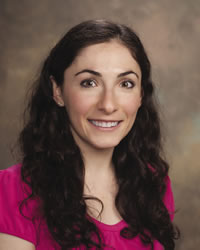In the course of any given year, patients in the Marshfield Clinic system have the opportunity to encounter more than 700 physicians across more than 50 locations in northern, central and western Wisconsin. Most of those patients probably have no idea how that person examining them became a doctor.
 Bella Lerman, D.O.
Bella Lerman, D.O.
Each doctor travels a different path before entering that examination room. A look through the eyes of one of the Clinic's current first-year pediatric residents, Bella Lerman, D.O., reveals an interest in caring for others that started at age 15 while witnessing the delivery of her brother.
Reflecting on her brother's care at the time, Lerman remembered: "I knew, at that moment, I wanted to make a difference in people's lives. I wanted to take an active role in medicine."
As with most future physicians, Lerman excelled in science and other health-related subjects in high school. As a senior, she entered the "Medical Science Academy," a unique shadowing program offered for those interested in pursuing a career in medicine.
Continuing down the health care path, Lerman enrolled at the University of Illinois at Chicago, a school with a strong pre-medical (pre-med) school program.
Nearly all pre-med students need to demonstrate a commitment that includes a strong grade point average, a vigorous science background, volunteer work in area medical facilities, effective research skills and letters of recommendation. In addition, all hopeful future physicians must take the Medical College Admission Test, the required standardized exam medical schools use to identify qualified candidates.
Lerman, a graduate of Nova Southeastern University College of Osteopathic Medicine in Florida, decided to follow the doctor of osteopathic medicine (D.O.) path. It allowed her the opportunity to receive traditional medical school training along with greater exposure to utilizing her hands as part of the diagnostic and healing process.
Medical school students spend the first two years concentrating on the fundamentals of medical sciences.
The third year of medical school is structured for students to work with patients under the supervision of experienced physicians in medical settings where they are exposed to "real life" cases. Fourth-year students continue those hands-on experiences while beginning to focus on a preferred specialty and preparing to start the very competitive process of applying to residency programs.
Students also must pass varying national licensing examinations in order to progress into subsequent years.
Medical student graduates then apply to obtain a coveted position in a residency program, under the supervision of senior physician educators. With residency trainees devoting up to 80 hours in any given week for three years or more, expectations are demanding.
For Lerman, her pediatric residency training at Marshfield Clinic has already been filled with learning opportunities.
"It's important for patients to realize how much time and energy we invest into this very long road, and we do it for them," she noted. "We want to be the best doctors we can be so that we can fully take care of them."
After completing 11 years or more of undergraduate, medical school and residency training, a physician must obtain a medical license from a state or jurisdiction of the United States in which they are planning to practice.
"In a couple short years, which will go by quickly, it will be up to me to fully care for patients and that's my motivation," Lerman said. "I have to be ready. It's constant learning."
